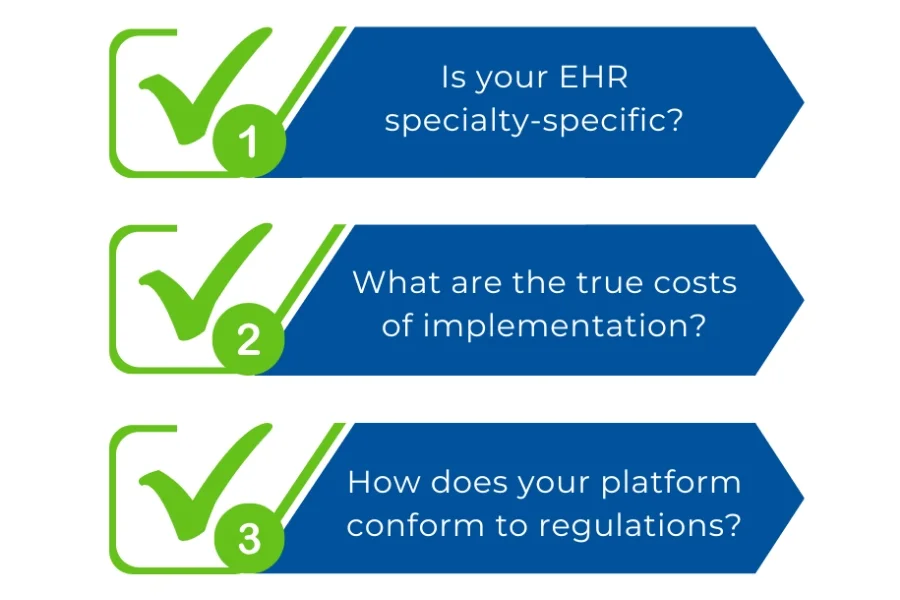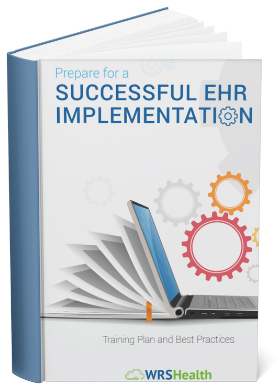Key Takeaways
- Specialty-specific platforms can significantly improve your practice’s workflows and patient outcomes.
- Implementation costs often include hidden fees, so clarify all expenses upfront.
- Compliance with regulatory requirements like ICD-10 is non-negotiable for modern EHR systems.
- Learn how one pain center used WRS Health to improve its RCM.
You know full well that running a practice relies on more than just delivering outstanding care. Success relies on seamless workflows, accurate patient records, and consistent compliance with healthcare regulations.
At the center tying all of these aspects together is an effective EHR platform. However, if your current system of record is falling short, it may be time to explore other options.
Selecting the right EHR vendor is a decision that will impact every aspect of your practice. Asking the right questions during the evaluation process can help you find a partner that aligns with your goals and sets your practice up for long-term success. Let’s explore the three most important questions you should ask EHR vendors.
Table of Contents
1. Does Your Platform Cater to Specialty-Specific Needs?
A mass-market, one-size-fits-all EHR may not meet the unique requirements of your practice. Specialty-specific EHR platforms address the nuances of particular fields, ensuring your workflows are intuitive and relevant. For instance, gastroenterology practices may require endoscopy reporting tools, while psychiatry practices benefit from flexible mental health assessment templates and secure telehealth options.
Want more proof? According to a 2022 Black Book survey, 76% of independent specialists agreed that specialist-specific EHRs would position them best for value-based reimbursement. Why? Because they streamline documentation and minimize the need for extensive customization.
When conducting an EHR vendors comparison, ask potential providers how their system supports your specialty. Inquire about templates, reporting capabilities, and integrated tools designed specifically for your field. This will help reduce the time spent adapting the system and increase overall productivity.
2. What Are the True Costs of Implementation?
Switching to a new EHR system can be an expensive process. Beyond the upfront licensing fees, there are often hidden costs related to training, data migration, and hardware upgrades.
When speaking with EHR vendors, request a detailed breakdown of all associated costs.Ask key questions including:
- Do you include training sessions in the pricing, or are they an additional expense?
- Do you provide data migration services, and if so, what’s the cost structure?
- Do you charge ongoing subscription fees or costs for software updates?
Understanding your full financial commitment upfront will prevent unwelcome surprises and help you allocate your resources effectively. Remember, the cheapest option isn’t always the best. Focus on the value the vendor brings to your practice.
Want to know more about WRS Health’s FREE implementation? Speak with our team.
3. How Will Your System Help Us Stay Compliant With Regulations?
Healthcare compliance is a cornerstone of any EHR platform. Regulations like ICD-10 and Meaningful Use (MU) are not just industry standards—they are legal requirements. Failure to comply can result in financial penalties and harm your practice’s reputation.
Ask your vendor how their system supports compliance efforts. Key features to look for include:
- Automatic updates for new coding standards.
- Real-time error checks to ensure billing accuracy.
- Built-in prompts for Meaningful Use criteria.
Compliance services and tools not only safeguard your practice, but also improve efficiency by reducing errors and ensuring accurate reimbursements.

Going Beyond the Basics: EHR Vendors Comparison Tips
While the three questions above cover core concerns, don’t stop there. A comprehensive EHR vendors comparison should also include the following considerations:
- User experience: A user-friendly interface minimizes training time and errors, ensuring your team can focus on patient care.
- Interoperability: Your EHR system should integrate seamlessly with labs, pharmacies, and other healthcare systems to streamline workflows.
- Customer support: Reliable support can make all the difference during implementation and daily use. Look for vendors with 24/7 assistance and a strong reputation for responsiveness.
- Case studies: Ask any potential vendor for real-world examples of how their platform performs. If they don’t have any, that could be a red flag that they might not have sufficient experience as a developer or don’t deliver comprehensive value to existing customers.
Know What You’re Getting Into
Choosing the right EHR vendor is about more than just software—it’s about finding a partner that understands your practice’s unique needs. By asking about specialty-specific platforms, implementation costs, and compliance tools, you’ll gain valuable insights to guide your decision.
Remember, the best EHR system is one that aligns with your goals, enhances your workflows, and ensures long-term success. Take the time to conduct thorough research and ask the tough questions. Your practice’s efficiency depends on it.






 QUICK CHARTING
QUICK CHARTING NOTE
NOTE MEDICATION
MEDICATION PATIENT
PATIENT BILLING
BILLING RISK
RISK MARKETING
MARKETING MIPS
MIPS